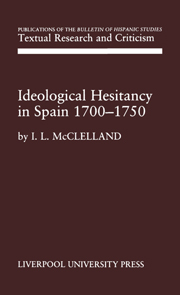Book contents
- Frontmatter
- Contents
- Dedication
- Preface
- CHAPTER 1 Reason of Unreason in the Spanish Vulgo
- CHAPTER 2 The False Alarm of ‘Scepticism’
- CHAPTER 3 The Vulgo-Conception of Scientific Evidence
- CHAPTER 4 The Psychological Significance of Pulpit Oratory
- CHAPTER 5 Witness of the Popular Stage
- CHAPTER 6 The Disturbing Effects of the Periodical Press
- Index
CHAPTER 2 - The False Alarm of ‘Scepticism’
- Frontmatter
- Contents
- Dedication
- Preface
- CHAPTER 1 Reason of Unreason in the Spanish Vulgo
- CHAPTER 2 The False Alarm of ‘Scepticism’
- CHAPTER 3 The Vulgo-Conception of Scientific Evidence
- CHAPTER 4 The Psychological Significance of Pulpit Oratory
- CHAPTER 5 Witness of the Popular Stage
- CHAPTER 6 The Disturbing Effects of the Periodical Press
- Index
Summary
The early decades of Spain's eighteenth century were fallow years of mental re-adjustment involving, severally or together, curiosity, distrust, confusion, passive and active assimilation, enterprise, hesitation and unease. Typical of the well informed thinkers of the period was the man who neither wholly committed himself to ideals of free scientific inquiry, nor closed his mind entirely to the importance of scientific discovery. Therefore, to understand the manner of his preparations for the age of rationalism, one must understand the reasons for his inner reservation and the nature of his contribution to the prevailing atmosphere of tension and cross-purpose. Especially is it necessary to observe how contradictory emotions – as may be present in uneasy curiosity – could operate abrasively in any one individual, or how intellectually susceptible men, like the influential Torres Villarroel, might echo both fashionable modernism and fashionable conservatism in fashionable terminology. The popular Torres was not as positively enlightened as he and his admirers supposed. Nor was he as penetrating as they believed in his assessment of the problem entailed in interpretations of scientific evidence. Many humbler, more cautious, or more timorous thinkers often perceived deeper complexities in the spirit of the European times than Torres, with his arrogant impatience, had noticed.
- Type
- Chapter
- Information
- Ideological Hesitancy in Spain 1700-1750 , pp. 9 - 57Publisher: Liverpool University PressPrint publication year: 1991



